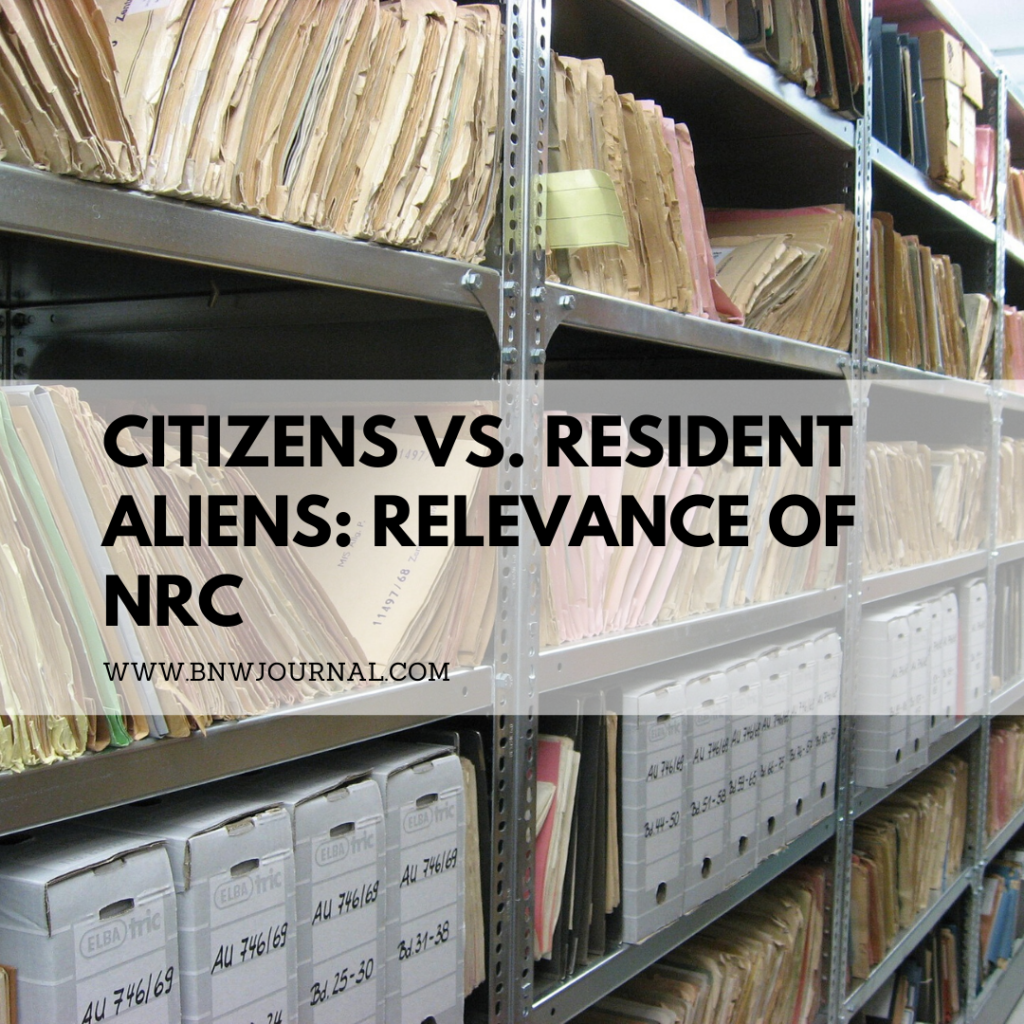![]()
Introduction
There has been a paradigm shift in the governance of the democracies in the twenty-first century. It has now become a matter of concern. People generally move either legally or illegally due to socioeconomic and political reasons. Like poverty, unemployment, climate change, or in search of better options of employment and for education. Indians has been facing the problem of cross-border migration from past few years. Most of the migration is undocumented.

The citizens of Bangladesh started immigrating into Assam due to various socio-economic and political reasons. This infiltration of illegal immigrants started posing an existential threat to the culture and language of Assam. This led to public protest against the illegal immigration.
To end these protests, NRC was declared in Assam by the Cabinet. NRC exercise helps to identify the illegal immigrants and citizens of India. This will help to deport back the illegal immigrants to their country of origin. After the publication of final list of NRC, the exclude people are given an opportunity to appeal to the appropriate authorities. It is to prove their citizenship. After the exhaustion of all the remedies, the then exclude people are declare as illegal immigrants.
But NRC has been a subject of number of controversies. The constitutional validity of NRC has always been question. The implementation, legal and procedural questions has ultimately put a question on its authenticity.
NRC Does not violate Article 14
Every person is entitled to equality before law and equal protection of laws [1] irrespective of whether he/she is a citizen or non-citizen. [2]. The underlying purpose of Article14 is to treat all persons similarly circumstanced alike, both in privileges conferred and liabilities imposed. [3] Article 14 forbids class legislation; it does not forbid reasonable classification of persons, objects and transactions. Not even by the legislature for the purpose of achieving specific ends. Classification to be reasonable should fulfill two tests:
1. It should not be arbitrary, artificial, or evasive. It should be based on an intelligible differentia. Some real and substantial distinction, which distinguishes persons or things grouped together in the class from others left out of it. [4]
2. The differentia adopt as the basis of classification must have a rational or reasonable nexus. Also with the object sought to be achieve by the statute in question. [5]
NRC is based on intelligible differentia. The differentia adopted as a basis of classification has a rational nexus with the object sought to be achieved. The classification is made to differentiate between the citizens of India and illegal immigrants. NRC is not arbitrary. The main aim of NRC is to differentiate the citizen of India from the illegal immigrants. And then to return all the illegal immigrants to their country of origin. This is done to protect and preserve the identity of Assam.
NRC is not violative of Article 21
Article 21 of the Constitution of India states that, “no person shall be deprive of right to life and personal liberty. Except according to the procedure established by law”. Right to live with human dignity is available to every person and even the State has no authority to violate that right except according to the procedure established by law. [6]
It has been held that law could be declared unconstitutional only when it has a direct and inevitable effect [7] on the fundamental rights and not merely an incidental or indirect effect on it. [8] No overt act is done by the government to threaten the life of the immigrants. The impugned exercise is done only to identify the illegal immigrants and to return them to their country of origin. There is no overt act on the part of the government which violates the life of the immigrants.
The Amendment V of the US Constitution lays down inter alia that “no person shall be deprived of his life, liberty and property, without due process of law. [9]
Due process of law has two aspects, i.e., Substantive and Procedural. Substantive due process envisages that the substantive provisions of law should be reasonable and not arbitrary. Procedural due process envisages a reasonable procedure, i.e., the person affected should have fair right of hearing which includes four elements-
(i) notice,
(ii) opportunity to be heard,
(iii) an impartial tribunal and
(iv) an orderly tribunal.
This is the process that gives the opportunity to be heard to those who have been declared foreign nationals. The tribunal and court is impartial and orderly one. The persons were declared as foreign nationals only after they had exhausted all the judicial remedies available to them to prove their citizenship. Therefore, NRC is a valid law, following a due process since the procedure is just, fair and reasonable.
The NRC is in Consonance with Article 355 of Constitution of India
Article 355 of the Constitution of Zedellin casts a duty on the Union to protect State against “external aggression” and “internal disturbance”. It shall hence be the duty of the Union to ensure that the govt. of every State is carried on in accordance with the provisions of this Constitution. [10]
In the case of Sarbananda Sonowal v. Union of India, [11] the Supreme Court accepted the view that large-scale influx of illegal migrants into a country amounts to external aggression and internal disturbances. The infiltration of large scale immigrants amounts to “aggression” on the state of Assam and also caused serious “internal disturbances” due to many protests. There have been periodic clashes that have been place between citizens of India and illegal immigrants. Therefore, it becomes the duty of the Union to take all measures for the protection of the state of Assam from such external aggressions and internal disturbances.
The NRC is in Consonance with the Public Trust Doctrine.
The Public Trust Doctrine primarily rests on the principle that certain natural resources are entrusted to the State for the public’s benefit. The govt. has an affirmative duty to act as a trustee in regard to these resources and the courts have an obligation to ensure that the govt. and its agencies fulfill this duty. [12] The State’s duty as a trustee is enforceable as far as the part IV principles are fundamental in governance of the country [13] and the State has to keep them in mind while making laws.
The influx of illegal immigrants has resulted into shortage of resources for the original natives of Assam. According to the public trust doctrine, the State is duty bound to protect the interest of its citizens above all. In the present case, the NRC is a step taken in furtherance of the same, and thus, stands valid.
References
| [1] | Faridabad CT.Scam Centre v. D.G. Health Services, (1997) 7 SCC 752. |
| [2] | Natural Resources Allocations, In Re Special References No.1 of 2012, (2012) 10 SCC 1. |
| [3] | MP Jain, Indian Constitutional Law, 907, (8th ed. 2018). |
| [4] | Laxmi Khandsari v. State of Uttar Pradesh (1981) 2 SCC 600. |
| [5] | Id. |
| [6] | People’s Union for Civil Liberties v. State of Maharashtra, (2014) 10 SCC 635. |
| [7] | Maneka Gandhi v. Union of India, (1978) 1 SCC 248. |
| [8] | Naresh v. State of Maharastra, (1996) 3 SCR 744. |
| [9] | MP Jain, Indian Constitutional Law, 1161 (8th ed. 2018). |
| [10] | The Constitution of India, 1950, Article 355. |
| [11] | Sarbananda Sonowal v. Union of India, (2005) 5 SCC 665. |
| [12] | Stevens, “The Public Right Trust A Soverign’s Ancient Prerogative becomes the People’s Environment Right”, 14 UC Davis L Rev 195 (1980) |
| [13] | The Constitution of India, 1950, Article 37. |



0 Comments